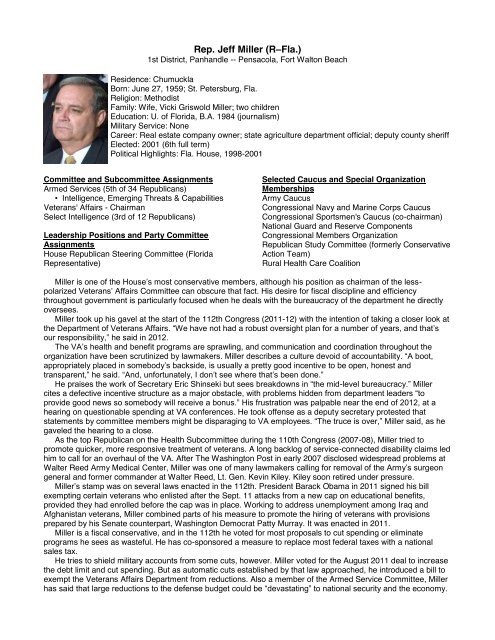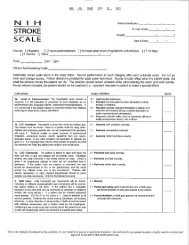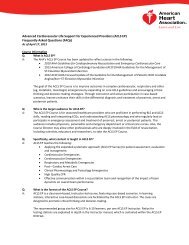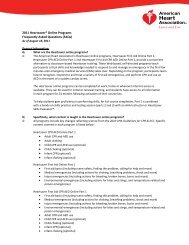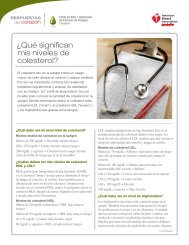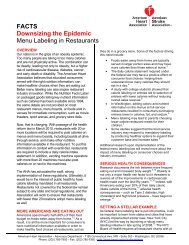Rep. Jeff Miller (RâFla.) - American Heart Association
Rep. Jeff Miller (RâFla.) - American Heart Association
Rep. Jeff Miller (RâFla.) - American Heart Association
Create successful ePaper yourself
Turn your PDF publications into a flip-book with our unique Google optimized e-Paper software.
<strong>Rep</strong>. <strong>Jeff</strong> <strong>Miller</strong> (R–Fla.)<br />
1st District, Panhandle -- Pensacola, Fort Walton Beach<br />
Residence: Chumuckla<br />
Born: June 27, 1959; St. Petersburg, Fla.<br />
Religion: Methodist<br />
Family: Wife, Vicki Griswold <strong>Miller</strong>; two children<br />
Education: U. of Florida, B.A. 1984 (journalism)<br />
Military Service: None<br />
Career: Real estate company owner; state agriculture department official; deputy county sheriff<br />
Elected: 2001 (6th full term)<br />
Political Highlights: Fla. House, 1998-2001<br />
Committee and Subcommittee Assignments<br />
Armed Services (5th of 34 <strong>Rep</strong>ublicans)<br />
• Intelligence, Emerging Threats & Capabilities<br />
Veterans' Affairs - Chairman<br />
Select Intelligence (3rd of 12 <strong>Rep</strong>ublicans)<br />
Leadership Positions and Party Committee<br />
Assignments<br />
House <strong>Rep</strong>ublican Steering Committee (Florida<br />
<strong>Rep</strong>resentative)<br />
Selected Caucus and Special Organization<br />
Memberships<br />
Army Caucus<br />
Congressional Navy and Marine Corps Caucus<br />
Congressional Sportsmen's Caucus (co-chairman)<br />
National Guard and Reserve Components<br />
Congressional Members Organization<br />
<strong>Rep</strong>ublican Study Committee (formerly Conservative<br />
Action Team)<br />
Rural Health Care Coalition<br />
<strong>Miller</strong> is one of the House’s most conservative members, although his position as chairman of the lesspolarized<br />
Veterans’ Affairs Committee can obscure that fact. His desire for fiscal discipline and efficiency<br />
throughout government is particularly focused when he deals with the bureaucracy of the department he directly<br />
oversees.<br />
<strong>Miller</strong> took up his gavel at the start of the 112th Congress (2011-12) with the intention of taking a closer look at<br />
the Department of Veterans Affairs. “We have not had a robust oversight plan for a number of years, and that’s<br />
our responsibility,” he said in 2012.<br />
The VA’s health and benefit programs are sprawling, and communication and coordination throughout the<br />
organization have been scrutinized by lawmakers. <strong>Miller</strong> describes a culture devoid of accountability. “A boot,<br />
appropriately placed in somebody’s backside, is usually a pretty good incentive to be open, honest and<br />
transparent,” he said. “And, unfortunately, I don’t see where that’s been done.”<br />
He praises the work of Secretary Eric Shinseki but sees breakdowns in “the mid-level bureaucracy.” <strong>Miller</strong><br />
cites a defective incentive structure as a major obstacle, with problems hidden from department leaders “to<br />
provide good news so somebody will receive a bonus.” His frustration was palpable near the end of 2012, at a<br />
hearing on questionable spending at VA conferences. He took offense as a deputy secretary protested that<br />
statements by committee members might be disparaging to VA employees. “The truce is over,” <strong>Miller</strong> said, as he<br />
gaveled the hearing to a close.<br />
As the top <strong>Rep</strong>ublican on the Health Subcommittee during the 110th Congress (2007-08), <strong>Miller</strong> tried to<br />
promote quicker, more responsive treatment of veterans. A long backlog of service-connected disability claims led<br />
him to call for an overhaul of the VA. After The Washington Post in early 2007 disclosed widespread problems at<br />
Walter Reed Army Medical Center, <strong>Miller</strong> was one of many lawmakers calling for removal of the Army’s surgeon<br />
general and former commander at Walter Reed, Lt. Gen. Kevin Kiley. Kiley soon retired under pressure.<br />
<strong>Miller</strong>’s stamp was on several laws enacted in the 112th. President Barack Obama in 2011 signed his bill<br />
exempting certain veterans who enlisted after the Sept. 11 attacks from a new cap on educational benefits,<br />
provided they had enrolled before the cap was in place. Working to address unemployment among Iraq and<br />
Afghanistan veterans, <strong>Miller</strong> combined parts of his measure to promote the hiring of veterans with provisions<br />
prepared by his Senate counterpart, Washington Democrat Patty Murray. It was enacted in 2011.<br />
<strong>Miller</strong> is a fiscal conservative, and in the 112th he voted for most proposals to cut spending or eliminate<br />
programs he sees as wasteful. He has co-sponsored a measure to replace most federal taxes with a national<br />
sales tax.<br />
He tries to shield military accounts from some cuts, however. <strong>Miller</strong> voted for the August 2011 deal to increase<br />
the debt limit and cut spending. But as automatic cuts established by that law approached, he introduced a bill to<br />
exempt the Veterans Affairs Department from reductions. Also a member of the Armed Service Committee, <strong>Miller</strong><br />
has said that large reductions to the defense budget could be “devastating” to national security and the economy.
His Panhandle district is home to thousands of active-duty military personnel as well as tens of thousands of<br />
military retirees.<br />
<strong>Miller</strong> is a member of the <strong>Rep</strong>ublican Study Committee, a group of the House’s most conservative members.<br />
He voted against the fiscal 2011 defense authorization bill because it included a provision that would repeal the<br />
ban on openly gay individuals serving in the military. He opposed stand-alone legislation to do the same that was<br />
enacted at the end of 2010.<br />
He’s also a strong advocate of gun rights — his office is adorned with a variety of taxidermied animals. The<br />
House in 2012 passed his bill to keep public lands open to recreational hunting, fishing and shooting unless<br />
federal agencies have certain specific reasons for a prohibition. It didn’t move in the Senate.<br />
From the Intelligence Committee, <strong>Miller</strong> takes an interest in Iran’s nuclear program. <strong>Miller</strong> said in 2012 that the<br />
United States should have a defined sense of which Iranian actions will trigger a military response. “There should<br />
be red lines,” he said. “It does not necessarily mean there should be published red lines. But the [Obama]<br />
administration has clearly said there are no red lines. Why would you say that? It doesn’t make sense.<br />
“Iran cannot be allowed to obtain a nuclear weapon. And when they get to the point where they have it, it’s too<br />
late.”<br />
Generally speaking, <strong>Miller</strong> is not a fan of the Obama administration’s military or diplomatic policies. “The<br />
United States has always led with strength,” he said. “This administration has not done that.”<br />
A former small-business owner, <strong>Miller</strong> is close to the business leaders in his community, many of whom rely on<br />
a robust tourism economy. He fought the George W. Bush administration’s plan to open gas and oil drilling within<br />
20 miles of the coast, complaining it would interfere with military training and weapons testing. He also backed a<br />
bill, later rolled into a 2012 surface transportation law, that gives the Gulf Coast states at least 80 percent of the<br />
Clean Water Act fines collected in relation to the 2010 oil spill in the gulf.<br />
<strong>Miller</strong> is a sixth-generation Floridian. His parents sold real estate and operated a cattle ranch near Clearwater.<br />
His own résumé is eclectic. While in high school, <strong>Miller</strong> was a disc jockey for the local radio station. Later, he<br />
had a stint as a deputy county sheriff and held part-time jobs as a stock car racer and auctioneer.<br />
He studied journalism at the University of Florida, where he served as president of the university’s education<br />
fraternity, Alpha Gamma Rho, and then as president of the school’s fraternity system. Subsequently, he was<br />
elected president of college fraternities for southeast Florida.<br />
After college, <strong>Miller</strong> joined the staff of Florida Agriculture Commissioner Doyle Connor. He later served as a<br />
state representative for the heavily <strong>Rep</strong>ublican north Florida area he now represents in Congress.<br />
<strong>Miller</strong> arrived in Congress in October 2001 after winning a special election to replace <strong>Rep</strong>ublican Joe<br />
Scarborough, who had resigned. (He’s now an MSNBC host.) <strong>Miller</strong> garnered 66 percent of the vote, and his reelections<br />
have not been competitive contests.
<strong>Rep</strong>. Steve Southerland II (R–Fla.)<br />
2nd District, Panhandle -- Tallahassee, Panama City<br />
Residence: Panama City<br />
Born: Oct. 10, 1965; Nashville, Tenn.<br />
Religion: Southern Baptist<br />
Family: Wife, Susan Southerland; four children<br />
Education: Troy State U., B.S. 1987 (business management); <strong>Jeff</strong>erson State Community<br />
College, A.A. 1989 (mortuary science)<br />
Military Service: None<br />
Career: Funeral home owner<br />
Elected: 2010 (2nd term)<br />
Political Highlights: ; Fla. Board of Funeral Directors and Embalmers, 1992-95<br />
Committee and Subcommittee Assignments<br />
Natural Resources (17th of 26 <strong>Rep</strong>ublicans)<br />
• Fisheries, Wildlife, Oceans & Insular Affairs<br />
Transportation & Infrastructure (21st of 33<br />
<strong>Rep</strong>ublicans)<br />
• Coast Guard & Maritime Transportation<br />
• Highways & Transit<br />
Selected Caucus and Special Organization<br />
Memberships<br />
Congressional Sportsmen's Caucus<br />
<strong>Rep</strong>ublican Study Committee (formerly Conservative<br />
Action Team)<br />
Southerland says he’s more comfortable among fishers and farmers than politicians and pundits. He has a<br />
blunt take on Washington’s political culture: “I don’t like this place.”<br />
“When I go home on the weekends and put on my flip flops and my shorts and my John Deere hat, I go to<br />
Walmart,” he said. “I walk up and down those aisles, and I hear all I need to hear. I don’t need to hear from a<br />
political prognosticator on what I need to do or how I need to do it. I go to Walmart.”<br />
He operated a funeral home and had no legislative experience before joining Congress in 2011. Southerland is<br />
one of the more conservative members of the House GOP Conference, and he’s not fazed by political<br />
brinkmanship.<br />
His concern for the nation’s fiscal health was one of his reasons for getting into politics. He wants large and<br />
immediate spending cuts, plus structural changes to government spending habits. During deficit reduction<br />
debates in July 2011, Southerland was one of 22 <strong>Rep</strong>ublicans to reject a plan put forth by Speaker John A.<br />
Boehner — conservatives felt it didn’t have a strong-enough commitment to adding a balanced-budget<br />
amendment to the Constitution. Southerland also opposed the fiscal 2012 appropriations bills, which hard-liners<br />
viewed as spending too much.<br />
“I think tension is a good thing,” Southerland said in early 2012. “It’s how you grow muscle. Stress and<br />
pressure and heat — that’s how diamonds are made.” He made a good impression on his colleagues in the<br />
<strong>Rep</strong>ublican Class of 2010, who elected him as their representative on the House leadership team in early 2013.<br />
He replaced Tim Scott of South Carolina, who was appointed to the Senate.<br />
Southerland views his committee seats as bases from which he can combat federal interference in the<br />
economy. As a freshman, he was assigned to the Agriculture, Natural Resources and Transportation and<br />
Infrastructure committees. Southerland says that when he was offered the chance to leave the Agriculture and<br />
Natural Resources committees for another posting in his first term, “I said thanks, but no thanks. Somebody here<br />
needs to fight for farmers. Somebody here needs to fight for fishermen.”<br />
However, he did step down from the Agriculture Committee in February 2013 to “dedicate additional focus to<br />
my other committee assignments and legislative responsibilities.” In addition to being a class liaison, Southerland<br />
is active in the <strong>Rep</strong>ublican Study Committee, heading up an anti-poverty task force for that conservative group.<br />
He has co-authored legislation to block the Obama administration from changing work requirements in the 1996<br />
welfare overhaul law.<br />
On Natural Resources, Southerland wants to speed up the permitting process for energy production in the Gulf<br />
of Mexico, while maintaining safety reviews — many constituents in his Panhandle district rely on the gulf for their<br />
livelihood. However, Southerland in the 112th Congress (2011-12) did vote against several measures to expand<br />
offshore drilling. He said he couldn’t support drilling near the Panhandle that might interfere with operations at one<br />
of the area’s many military bases.<br />
In December 2012, he praised the EPA’s decision to approve Florida’s numeric nutrient standards for water<br />
quality. He favors allowing the state to determine its own standards for nitrogen and phosphorus pollutants, which<br />
are often linked to farming. He had introduced a bill on the matter.
Southerland served on the conference committee that finalized a two-year reauthorization of surface<br />
transportation programs enacted in 2012. He contributed to a bill, which was rolled into that highway law, that<br />
gives Gulf Coast states the lion’s share of Clean Water Act fines collected in relation to the 2010 gulf oil spill.<br />
He wants to improve Florida’s “rate of return” — the amount of federal transportation funding it gets relative to<br />
what the state’s highway users pay in federal highway taxes. Southerland was pleased with the provisions in the<br />
2012 law meant to streamline regulatory reviews of infrastructure projects.<br />
His departure from the Agriculture Committee lessens his involvement on any potential long-term<br />
reauthorization of farm programs in the 113th Congress (2013-14). He calls for greater scrutiny of food assistance<br />
programs — the panel-approved version of the 2012 farm bill, which never got a floor vote, had $16.1 billion in<br />
cuts to the Supplemental Nutrition Assistance Program. Southerland was one of the 13 panel <strong>Rep</strong>ublicans<br />
supporting an unsuccessful amendment to double that amount.<br />
Born in Tennessee, Southerland has spent most of his life in Florida. The funeral home business started by his<br />
grandfather was a constant presence in his life, with four business lines ringing in the house at all hours. “I have a<br />
business that is 60 years old, and it has never been closed a day,” he said. “We’ve never signed a death<br />
certificate in the history of our family company … that said ‘this individual died from work.’ Work is a good thing.”<br />
Southerland graduated from Troy State University in 1987 with a degree in business management, then got an<br />
associate’s degree in mortuary science from <strong>Jeff</strong>erson State Community College in 1989. His business “has<br />
allowed me to know every area and every sector of my community,” he said. “I bury fishermen, I bury Wall Street<br />
tycoons. We serve families in all walks of life. Loggers, fishermen, oystermen, accountants, attorneys, brokers —<br />
it doesn’t matter. You’re coming to a funeral home.”<br />
Southerland met his wife, Susan, in the first grade, and they now have four daughters. His only prior political<br />
experience came as a member of the Florida Board of Funeral Directors and Embalmers, serving from 1992 to<br />
1995. But he did help establish a Florida tea party group.<br />
Democratic <strong>Rep</strong>. Allen Boyd, a seven-term incumbent, had never been in a close House election. But he<br />
supported the 2010 health care overhaul as he was fending off a primary-election challenge from state Senate<br />
Minority Leader Al Lawson. The National <strong>Rep</strong>ublican Congressional Committee poured money into Southerland’s<br />
campaign. Democrats answered with financial support for Boyd, but Southerland — a former Democrat, like many<br />
Panhandle <strong>Rep</strong>ublicans — rode the GOP wave to a 12-point victory.<br />
Lawson won the Democratic primary in 2012. He was enough of a threat that the NRCC bought broadcast time<br />
in the Panama City and Tallahassee media markets. Southerland won with nearly 53 percent of the vote.
<strong>Rep</strong>. Gus Bilirakis (R–Fla.)<br />
12th District, West -- suburbs north of Tampa<br />
Pronounced: bil-uh-RACK-iss<br />
Residence: Palm Harbor<br />
Born: Feb. 8, 1963; Gainesville, Fla.<br />
Religion: Greek Orthodox<br />
Family: Wife, Eva Bilirakis; four children<br />
Education: St. Petersburg Junior College, attended 1981-83; U. of Florida, B.A. 1986 (political<br />
science); Stetson U., J.D. 1989<br />
Military Service: None<br />
Career: Lawyer; college instructor<br />
Elected: 2006 (4th term)<br />
Political Highlights: ; Fla. House, 1998-2006<br />
Committee and Subcommittee Assignments<br />
Energy & Commerce (27th of 30 <strong>Rep</strong>ublicans)<br />
• Commerce, Manufacturing & Trade<br />
• Environment & the Economy<br />
• Health<br />
Veterans' Affairs (3rd of 14 <strong>Rep</strong>ublicans)<br />
• Disability Assistance & Memorial Affairs<br />
Leadership Positions and Party Committee<br />
Assignments<br />
House <strong>Rep</strong>ublican Policy Committee<br />
Selected Caucus and Special Organization<br />
Memberships<br />
Congressional Human Rights Caucus<br />
National Guard and Reserve Components<br />
Congressional Members Organization<br />
<strong>Rep</strong>ublican Study Committee (formerly Conservative<br />
Action Team)<br />
Tea Party Caucus<br />
Michael Bilirakis was a 12-term representative with deep involvement in veterans issues and health care<br />
policy. His son, Gus, seems intent on building his father’s legacy into a family legacy.<br />
Now in his fourth term succeeding his father, the younger Bilirakis (bil-uh-RACK-iss) serves as vice chairman<br />
of the Veterans’ Affairs Committee — a job his father once held. He sits on both the Energy and Commerce<br />
Committee and the Health Subcommittee that his father once chaired. And for good measure, he shares his<br />
father’s regular-guy personality. Bilirakis mostly avoids the spotlight and advances his priorities by way of<br />
amendments to bills and by building friendships with colleagues.<br />
In joining Energy and Commerce for the 113th Congress (2013-14), Bilirakis waded into one of the more<br />
partisan environments in the House. It’s a definite departure from his earlier work, which focused largely on<br />
veterans and homeland security.<br />
Bilirakis isn’t the most conservative of <strong>Rep</strong>ublicans, but he does join his party’s opposition to the 2010 health<br />
care law, which he called “a trillion-dollar expansion of the federal government marred with special deals,<br />
mandates, tax hikes and Medicare cuts.”<br />
His Tampa-area district has lots of retirees and senior citizens, and Bilirakis is generally protective of Medicare<br />
and its benefit levels. He is wary of proposed payment cuts for private insurance plans linked to the Medicare<br />
system. “I know that the seniors in my district love their Medicare Advantage,” Bilirakis said in 2013. One of the<br />
first health care bills he introduced, in 2007, would have required Medicare to cover hearing aids. (Michael<br />
Bilirakis was the Health Subcommittee chairman when a prescription drug benefit was added to Medicare in<br />
2003.)<br />
Bilirakis’ support of the GOP’s “all of the above” energy policy is tempered by his worries about offshore oil<br />
drilling, particularly along the Gulf Coast. The House in early 2012 approved his amendment to a broad-ranging<br />
measure promoting fossil fuel development. Bilirakis’ provision would require a study of how Florida’s tourism and<br />
fishing are affected by energy development within 100 miles of the coast. He was one of 21 <strong>Rep</strong>ublicans to vote<br />
against the underlying bill, which passed the House but died in the Senate.<br />
Bilirakis, whose father is a Korean War veteran, became the vice chairman of Veterans’ Affairs in the 112th<br />
Congress (2011-12). He also served as chairman of the Veterans’ Affairs Task Force for the <strong>Rep</strong>ublican Policy<br />
Committee. He pursues wide-ranging health, psychological and employment assistance for veterans. President<br />
Barack Obama in early 2013 signed a Bilirakis bill meant to provide extra guidance for veterans using GI Bill<br />
education benefits.<br />
Under House rules, people serving on Energy and Commerce don’t get to sit on any other committees.<br />
Bilirakis had to get a waiver to keep his seat on Veterans’ Affairs, and he gave up spots on the Homeland Security<br />
and Foreign Affairs committees.
In the 112th, he chaired the Homeland Security Subcommittee on Emergency Preparedness, Response and<br />
Communications, which touches on the responses to both terrorism and natural disasters. Bilirakis was skeptical<br />
of the Obama administration’s proposal to consolidate several homeland security grant programs into a single<br />
National Preparedness Grant Program;; among other things, he worried grants wouldn’t make it through state<br />
governments to localities that needed them. Bilirakis wants grants awarded with preference for areas more likely<br />
to suffer attacks or disasters.<br />
He has suggested creating a tax credit for those spending to prepare their properties for hurricane or tornado<br />
strikes. And the full committee in 2012 approved his bill to modernize public alert and warning systems.<br />
Bilirakis has four times introduced his bill to strengthen background checks for student visa applicants. Bilirakis<br />
contends that terrorists could enter the country under the guise of seeking an education, then stay in the country<br />
thanks to lax requirements for keeping tabs on such visa holders.<br />
Like his father, Bilirakis takes an interest in foreign affairs that is shaped by his Greek heritage. Bilirakis’<br />
ancestors came to Tarpon Springs, which was settled mainly by Greek immigrants who worked as sponge divers,<br />
a century ago. In June 2012, he introduced a resolution “to end Turkey’s illegal occupation of the <strong>Rep</strong>ublic of<br />
Cyprus, to support Cyprus in its efforts to control all of its territory, and to allow Cyprus to explore its own energy<br />
resources without illegal interference by Turkey.”<br />
He’s a strong supporter of closer ties between Greece and Israel, and has backed sanctions against Iran as it<br />
tries to develop its nuclear program.<br />
Bilirakis belongs to the conservative <strong>Rep</strong>ublican Study Committee, but he isn’t beholden to its proposals.<br />
Bilirakis voted against a fiscal 2013 budget prepared by the RSC that was more austere than other GOP budget<br />
proposals. He can be fiscally conservative, however. Bilirakis in January 2013 joined most of his party in opposing<br />
a $50 billion measure tied to Superstorm Sandy relief, where most of the total was deemed off-budget<br />
“emergency” spending. He also endorses a plan to replace federal taxes with a single national sales tax.<br />
Bilirakis says he always wanted to follow his father’s example of a career in politics. He attended public<br />
schools, then studied at a community college in St. Petersburg before earning his undergraduate degree at the<br />
University of Florida with a major in political science. After getting a law degree from Stetson University, he<br />
worked in his father’s Palm Harbor practice.<br />
Bilirakis’ first foray into electoral politics on his own behalf was a successful run in 1998 for the state House<br />
seat representing Tampa. His opportunity to move up to the U.S. House came in 2006 with his father’s retirement.<br />
Bilirakis breezed through the primary, but the general election was tougher. He was helped to victory by his name<br />
recognition and public support from a bevy of <strong>Rep</strong>ublican heavies, including President George W. Bush. Bilirakis<br />
won his first term by 12 points.<br />
When Florida redrew its electoral map for the 2012 campaign, the closest match to Bilirakis’ old 9th District<br />
was the new 12th — a more compact district, but one still centered on suburbs north of Tampa. The 12th has a<br />
strong GOP lean, and Democrats didn’t field an experienced challenger.<br />
Bilirakis won more than 63 percent of the vote to defeat Democrat Jonathan Michael Snow, a 25-year-old<br />
Walgreens photo technician.
<strong>Rep</strong>. C.W. Bill Young (R–Fla.)<br />
13th District, West -- most of Pinellas County, St. Petersburg<br />
Residence: Indian Shores<br />
Born: Dec. 16, 1930; Harmarville, Pa.<br />
Religion: Methodist<br />
Family: Wife, Beverly Young; six children<br />
Education: St. Petersburg H.S., graduated 1948<br />
Military Service: Fla. National Guard 1948-1957<br />
Career: Insurance executive<br />
Elected: 1970 (22nd term)<br />
Political Highlights: Fla. Senate, 1960-70 (minority leader, 1966-70)<br />
Committee and Subcommittee Assignments<br />
Appropriations (2nd of 29 <strong>Rep</strong>ublicans)<br />
• Defense (chairman)<br />
• Legislative Branch<br />
• Military Construction-VA<br />
Selected Caucus and Special Organization<br />
Memberships<br />
Army Caucus<br />
Congressional Fire Services Caucus<br />
Congressional Human Rights Caucus<br />
Congressional Sportsmen's Caucus<br />
National Guard and Reserve Components<br />
Congressional Members Organization<br />
No current <strong>Rep</strong>ublican has been in Congress longer than Young, and only two House Democrats can claim<br />
more seniority. A month before his 82nd birthday, voters decided to give him a 22nd term. He remains an<br />
effective and influential member of the Appropriations Committee, but his occasional admissions of weariness<br />
have some people wondering how much longer he’ll be on Capitol Hill.<br />
However long it ends up being, it seems likely that Young will retain two clashing characteristics that make him<br />
effective: his amiable nature and his ability, when necessary, to fight members of either party.<br />
The 113th Congress (2013-14) began with 46 members who were born after Young was sworn into the House<br />
in 1971. He has shown his age more since back surgery in 2010, walking with a cane and periodically relying on<br />
aides for assistance in getting around.<br />
But he also has shown some spunk. Left-leaning activists staged a rally at one of Young’s Florida offices in<br />
December 2012, and one yelling protester got under Young’s skin. The octogenarian lawmaker grabbed the<br />
protester’s arm and appeared to wave his cane threateningly in the air.<br />
Young prefers the nice-guy approach, but he doesn’t back down from challenges. He voted for the fiscal 2012<br />
and 2013 budgets prepared by Wisconsin <strong>Rep</strong>ublican Paul D. Ryan, which included tax code overhauls and<br />
changes to entitlement programs. Democrats ran a 2011 ad saying Young had voted to “cut taxes for millionaires<br />
and end your Medicare.” The Tampa Bay Times reported his response: “I would never quit in the face of vicious<br />
attacks like that. It’s not me. I keep telling these guys, ‘You guys want me to retire, just be nice to me.’”<br />
He hasn’t been afraid to deviate from his party. Late in 2012 he said he’d consider approving tax increases as<br />
part of a deficit reduction package. He bucked GOP colleagues in earlier years by supporting a minimum-wage<br />
increase, a ban on certain semiautomatic weapons and federal aid to help protect Florida’s beaches from erosion.<br />
He opposes offshore drilling close to Florida’s coast and introduced a bill to beef up safety standards for offshore<br />
platforms.<br />
Young’s flexibility is attributable to political experience. He was the only <strong>Rep</strong>ublican in the Florida Senate when<br />
he joined that body in 1960, and he spent 24 years in the U.S. House minority before the GOP victories of 1994.<br />
Working with Democrats was necessary to accomplish anything. His mostly non-confrontational style resonates<br />
with the culture of the Appropriations Committee, where for years there was an tacit agreement to accede to<br />
others’ parochial spending projects in exchange for approval of your own.<br />
When <strong>Rep</strong>ublicans won the majority in 1994, Young and two other senior members of Appropriations were<br />
passed over for the chairmanship. Young settled for the gavel of the Defense Subcommittee. When he finally took<br />
over the full committee in 1999, he allowed conservatives to dominate the early stages of budget negotiations<br />
until legislative reality — the need to gain President Bill Clinton’s signature — set in.<br />
GOP term limits forced him back to the subcommittee chairmanship in 2005, and he stayed on as its ranking<br />
member through four years of Democratic control. He got a waiver from term limits to again become chairman in<br />
the 112th Congress (2011-12), and another waiver for the 113th.<br />
He had a close working relationship with Democrat John P. Murtha of Pennsylvania, the former chairman of<br />
the Defense Subcommittee, but it ended with Murtha’s death after surgical complications in 2010. In the 113th
he’s without another Democratic sidekick, as Norm Dicks of Washington retired. Young has outlived the two<br />
senators who led their chamber’s Defense spending panel for many years: <strong>Rep</strong>ublican Ted Stevens of Alaska,<br />
who perished in a 2010 plane crash two years after leaving the Senate, and Democrat Daniel K. Inouye of Hawaii,<br />
who died of respiratory problems in late 2012.<br />
For more than a decade after the terrorist attacks of 2001, the bipartisan team oversaw approval of a huge<br />
buildup in defense spending, nearly doubling the regular budget and providing several hundred billion dollars for<br />
the wars in Iraq and Afghanistan.<br />
Young had supported those U.S. military deployments until September 2012, when — in another act of<br />
apostasy against the party line — he told a local newspaper that he felt it was time to bring troops home from<br />
Afghanistan. “I just think we’re killing kids that don’t need to die,” he said.<br />
Young and his Democratic colleagues also teamed up to obtain earmarks, spending targeted for special<br />
projects in a particular district or state. Murtha and Young were legendary for their efforts in that regard, but<br />
earmarking was effectively banned starting in 2010.<br />
On the Military Construction-VA Subcommittee, Young works to deliver aid to wounded veterans. He found<br />
himself on the defensive in 2007, when concerns arose about mismanagement and soldiers’ poor living conditions<br />
at Walter Reed Army Medical Center in Washington, D.C. Young routinely had visited soldiers there without<br />
commenting on the center’s conditions.<br />
Young said he knew of the problems as early as 2003 but preferred to confront the hospital commander<br />
privately rather than go public or wield his appropriator’s clout. The facility closed in 2011 as a result of base<br />
realignment.<br />
Young was born into hardscrabble poverty in western Pennsylvania’s coal country during the Great<br />
Depression. His father, an alcoholic, abandoned the family when Young was a boy. After his mother became ill,<br />
the family stayed with relatives in St. Petersburg. Young never went to college but worked his way to success in<br />
the insurance business. He entered politics in 1960 when he was elected to the state Senate.<br />
In 1970 he won the state’s most dependably <strong>Rep</strong>ublican U.S. House seat, which opened up after William C.<br />
Cramer decided to run for the Senate. Even in years when his district leaned Democratic, Young usually was reelected<br />
with ease. Since 1978, Democrats have fielded a candidate against him only about half the time.<br />
Redistricting for 2012 put him in the new 13th District, and he had a spirited challenger in Democrat Jessica<br />
Ehrlich, a 38-year-old lawyer and former congressional aide. It was Young’s closest race since 1992, but he still<br />
won by 15 points.
<strong>Rep</strong>. Kathy Castor (D–Fla.)<br />
14th District, Tampa, south St. Petersburg<br />
Residence: Tampa<br />
Born: Aug. 20, 1966; Miami, Fla.<br />
Religion: Presbyterian<br />
Family: Husband, Bill Lewis; two children<br />
Education: Emory U., B.A. 1988 (political science); Florida State U., J.D. 1991<br />
Military Service: None<br />
Career: Lawyer<br />
Elected: 2006 (4th term)<br />
Political Highlights: Democratic nominee for Fla. Senate, 2000; Hillsborough County Board of<br />
Commissioners, 2002-06<br />
Committee and Subcommittee Assignments<br />
Budget (7th of 17 Democrats)<br />
Energy & Commerce (18th of 24 Democrats)<br />
• Energy & Power<br />
• Health<br />
• Oversight & Investigations<br />
Selected Caucus and Special Organization<br />
Memberships<br />
Congressional Caucus for Women's Issues<br />
A dependable Democrat, Castor comes from a family tradition of public service. Excellent relations with her<br />
party’s leadership have yielded her opportunities to lock in on health care and energy, topics of major importance<br />
to her coastal district.<br />
Castor’s parents, brother and sister all have run for elected office, and her maternal grandfather was mayor of<br />
Glassboro, N.J. After an unsuccessful state Senate run in 2000, Castor was elected in 2002 to the Hillsborough<br />
County Board of Commissioners; she had sat in on board meetings as a child when her mother served there.<br />
“I loved the idea of public service from an early age,” Castor said. “Being the daughter of a trailblazing female,<br />
I was inspired by her, even when confronted with doubts about women in politics” from other people. Betty Castor<br />
went on to become a Florida state senator, the state education commissioner, and the 2004 Democratic nominee<br />
for the U.S. Senate, a race she lost by 1 percentage point to <strong>Rep</strong>ublican Mel Martinez.<br />
The younger Castor has been in the good graces of the Democratic Party since arriving in the House in 2007.<br />
As a freshman she began a stint on the Democratic Steering Committee, which hands out committee<br />
assignments to caucus members; she also sat on the powerful Rules Committee, which sets terms for floor<br />
debate. In the 111th Congress (2009-10) she moved to the Energy and Commerce Committee, in time to work on<br />
Democrats’ health care overhaul and consumer protection issues.<br />
Castor lost that seat with the GOP takeover in 2011, but returned six months later when the resignation of New<br />
York’s Anthony Weiner created a vacancy. “All of the issues that Energy and Commerce considers — energy,<br />
health care, Medicaid and Medicare, tourism — are important to Florida,” she said.<br />
Castor is an ardent defender of the 2010 health care law and a critic of Florida Gov. Rick Scott, a <strong>Rep</strong>ublican<br />
who refused in 2012 to implement the law’s expansion of Medicaid. Scott has “a very narrow vision,” Castor said.<br />
She takes a particular interest in children’s health issues. Castor, who co-founded the bipartisan Children’s Health<br />
Care Caucus, led 2008 floor debate on a bill to expand the State Children’s Health Insurance Program, which<br />
provides insurances to children from low-income families that do not qualify for Medicaid. President Obama<br />
signed a later incarnation of the bill in early 2009.<br />
When dealing with energy and the environment, Castor brings a decade of experience practicing<br />
environmental law; she also chaired the Environmental Protection Commission for Hillsborough County. In the<br />
112th Congress (2011-12), she served as co-chairwoman of a new Gulf Coast Caucus, which successfully<br />
pushed for a law that will steer to the Gulf Coast states a large share of fines collected under the Clean Water Act<br />
related to the 2010 Deepwater Horizon oil spill.<br />
Castor opposes efforts to drill for oil and gas off the Florida coast — one of the few issues in which she has<br />
disagreed with President Obama. In March 2010, Obama proposed studying areas in the eastern gulf for<br />
expanded leases. Castor countered that a 235-mile buffer zone off the west coast of Florida that was created in<br />
2006 should be maintained. After the spill, Obama retreated on his call for study, and Castor proposed<br />
permanently banning drilling off the Gulf Coast and the straits of Florida.<br />
Castor, who has had stints on the Armed Services Committee, cites the “colossal blunder” of the Iraq War as<br />
her motivation for her 2006 House campaign. Despite her concerns about the war, Castor is an advocate for the<br />
troops and a defender of MacDill Air Force Base, a major employer in her district. In 2012, she spearheaded a<br />
public awareness campaign dubbed “MacDill Means Mobility” that aimed to raise the profile of the base and bring
military-related jobs to the district. The effort was backed by the other lawmakers near Tampa, all of whom are<br />
<strong>Rep</strong>ublicans.<br />
On the Budget Committee, Castor joined in Democratic attacks on the fiscal 2012 and 2013 budgets of<br />
Chairman Paul D. Ryan, a Wisconsin <strong>Rep</strong>ublican, with a particular emphasis on potential cuts to federal health<br />
care programs. Castor is close to Budget’s top Democrat, Chris Van Hollen of Maryland.<br />
She also has strong working relationships with Florida Democratic Sen. Bill Nelson and several female<br />
Democratic lawmakers, including <strong>Rep</strong>. Jan Schakowsky of Illinois, <strong>Rep</strong>. Allyson Y. Schwartz of Pennsylvania and<br />
Sen. Kirsten Gillibrand of New York. Castor hosted a baby shower for Gillibrand that was open to all<br />
congresswomen of both parties. Castor herself has two daughters and says family consumes her time away from<br />
work: “People should know I’m a soccer mom.”<br />
The work of Castor’s parents, who divorced when she was 11, was key to the development of her political<br />
philosophy. “You learned about speaking up for people who don’t have a voice,” she said. Her father, Don, was a<br />
Hillsborough County judge and helped found Bay Area Legal Services, a nonprofit group that serves low-income<br />
families.<br />
Castor first arrived in Washington as a college intern in the office of Florida Democratic Sen. Lawton Chiles. “I<br />
never imagined then that I’d return as a member,” she said. After graduating from Emory University in Atlanta and<br />
earning a law degree from Florida State, where she met her husband Bill Lewis, Castor worked in the Department<br />
of Community Affairs in Tallahassee enforcing environmental laws.<br />
She returned to Tampa in the mid-1990s to work in a law firm representing the city on zoning issues. On the<br />
Hillsborough County board, she was a liberal voice amid the conservative majority. She won support for greater<br />
disclosure of commissioners’ travel costs and meetings with lobbyists. In 2005, she was the lone dissenting vote<br />
when the panel blocked the county government from recognizing gay pride events.<br />
Castor’s path to the House opened when Democratic <strong>Rep</strong>. Jim Davis made a failed bid for governor in 2006.<br />
She became the early favorite by capitalizing on her name recognition and financial support from EMILY’s List, a<br />
political committee that backs Democratic women who support abortion rights.<br />
She won the five-way primary with 54 percent of the vote and trounced GOP architect Eddie Adams in the<br />
general election with 69 percent of the vote. A rematch two years later had similar results.
Sen. Marco Rubio (R–Fla.)<br />
Junior Senator from Florida<br />
Residence: West Miami<br />
Born: May 28, 1971; Miami, Fla.<br />
Religion: Roman Catholic<br />
Family: Wife, Jeanette Rubio; four children<br />
Education: Tarkio College, attended 1989-90; Santa Fe Community College, attended 1990-91;<br />
U. of Florida, B.S. 1993 (political science); U. of Miami, J.D. 1996<br />
Military Service: None<br />
Career: Lawyer; campaign aide<br />
Elected: 2010 (1st term); Defeated <strong>Rep</strong>. Kendrick B. Meek, D, to succeed George LeMieux, R,<br />
who retired<br />
Political Highlights: West Miami City Commission, 1998-00; Fla. House, 2000-2008 (majority<br />
leader, 2003-06; speaker, 2006-08)<br />
Committee and Subcommittee Assignments<br />
Commerce, Science & Transportation (4th of 11<br />
<strong>Rep</strong>ublicans)<br />
• Aviation Operations, Safety & Security<br />
• Communications, Technology & the Internet<br />
• Oceans, Atmosphere, Fisheries & Coast Guard<br />
(ranking member)<br />
• Science & Space<br />
• Surface Transportation and Merchant Marine<br />
Foreign Relations (3rd of 8 <strong>Rep</strong>ublicans)<br />
• East Asian & Pacific Affairs (ranking member)<br />
• International Operations & Organizations<br />
• Near Eastern & South & Central Asian Affairs<br />
• Western Hemisphere & Global Narcotics Affairs<br />
Small Business & Entrepreneurship (3rd of 8<br />
<strong>Rep</strong>ublicans)<br />
Select Intelligence (5th of 7 <strong>Rep</strong>ublicans)<br />
Selected Caucus and Special Organization<br />
Memberships<br />
Commission on Security and Cooperation in Europe<br />
Rubio is seen by many in the <strong>Rep</strong>ublican Conference as a new face of their party: He’s young, telegenic,<br />
conservative and willing to step out front on some issues of national importance. So far, he has dismissed<br />
speculation about an appearance on a national ticket in 2016, but the talk hasn’t gone away.<br />
He was vetted as a possible running mate to presidential nominee Mitt Romney in 2012, and Rubio eventually<br />
had the honor of introducing Romney during the <strong>Rep</strong>ublican National Convention in August 2012. He delivered an<br />
address saturated with his life story — he’s the son of Cuban immigrants — and his vision of the <strong>American</strong> dream.<br />
“In America, we are all just a generation or two removed from somebody who made our future the purpose of<br />
their lives,” he said. “To make sure that America is still a place where tomorrow is always better than yesterday,<br />
that is what our politics should be about.” Rubio also delivered the GOP response to President Barack Obama’s<br />
State of the Union address in 2013.<br />
Part of the interest in Rubio is undeniably linked to his ethnicity. <strong>Rep</strong>ublicans did not do well with Hispanic<br />
voters in the 2012 elections, and Rubio seems to embrace the role of potential ambassador between his party<br />
and minorities on issues of immigration and citizenship.<br />
At the start of the 113th Congress (2013-14) he jumped into immigration overhaul proposals as a member of a<br />
bipartisan group of eight senators that produced a framework for changes: enhance border security; give those<br />
who are in the country illegally an opportunity at “probationary legal status”;; create a separate path to citizenship<br />
for illegal immigrants who were brought to the U.S. as minors; and create an electronic employment verification<br />
system.<br />
He teamed up with Utah <strong>Rep</strong>ublican Orrin G. Hatch and Democrats Amy Klobuchar of Minnesota and Chris<br />
Coons of Delaware on a bill to update immigration laws for high-skilled jobs. Laws regarding legal immigration<br />
“have to move toward merit and skill-based immigration,” he told the Wall Street Journal.<br />
“I live this issue on a daily basis,” Rubio said on the Senate floor in January 2013. “I live in a family of<br />
immigrants, married into a family of immigrants, in a neighborhood of immigrants, in a community of immigrants. I<br />
see all the good things legal immigration has done for America, and I see the strain illegal immigration places on<br />
our country.”<br />
Rubio sits on the Foreign Relations Committee and also the bicameral Commission on Security and<br />
Cooperation in Europe (aka the Helsinki Commission). While he is a fiscal conservative, he hasn’t called for major<br />
reductions in foreign aid. “The central issue of foreign policy today is this balance between making sure we’re not<br />
trying to do more than we can, and ensuring that we’re not doing less than we should,” he said at a 2013 hearing.<br />
Rubio has suggested that it’s appropriate for the United States to encourage the establishment and<br />
development of functioning democracies around the globe. In 2011 he participated in a <strong>Rep</strong>ublican filibuster<br />
against the nominee for ambassador to El Salvador, saying it was to protest the Obama administration’s Western
Hemisphere policies. When he dropped his opposition, he said he had gotten assurances that the White House<br />
would consider a stronger response to allegedly fraudulent elections in Nicaragua.<br />
Like many Cuban-<strong>American</strong> politicians, he is an implacable foe of the Castro dictatorship. The Washington<br />
Post reported in 2011 that Rubio may have embellished the details of his family’s history;; though Rubio had<br />
asserted on his Senate website and in other settings that his parents fled the Castro regime, official documents<br />
indicated that they came to the United States more than two years before Fidel Castro assumed power. Rubio’s<br />
office asserted to the Post that the family visited Cuba after Castro’s takeover with hopes of returning, then<br />
returned to the United States.<br />
Rubio also sits on the Intelligence Committee. He has said the George W. Bush administration was wrong to<br />
remove North Korea from the list of state sponsors of terrorism; he also wants less of a focus on the Israel-<br />
Palestine debate and more on Iran possessing nuclear weapon capabilities.<br />
From the Commerce, Science and Transportation Committee, he favors offshore oil and gas drilling, despite<br />
many Floridians’ objections to drilling off the coast of the state.<br />
Spending debates dominated Rubio’s freshman term in the 112th Congress (2011-12). He joins many<br />
<strong>Rep</strong>ublicans in the belief that any serious effort to cut federal spending will include an overhaul of entitlement<br />
programs. He’s open to altering the formula for calculating cost-of-living increases and raising the retirement age.<br />
Rubio opposed a short-term suspension of the federal government’s borrowing limit as one of his first votes of<br />
the 113th Congress. He also opposed a December 2012 bill to provide $60.4 billion in emergency spending for<br />
communities hit by Superstorm Sandy. The year before, he opposed a package of appropriations bills providing<br />
$915 billion in spending for fiscal 2012.<br />
The bill “spends too much, wastes precious taxpayer dollars to fund a menu of job-killing regulations, anti-life<br />
provisions and earmarks, and has been ushered through Congress in a highly secretive and nontransparent<br />
manner that didn’t allow for consideration of even a single amendment,” Rubio wrote.<br />
Rubio is a social conservative. He introduced a bill to prohibit requiring organizations to provide coverage for<br />
contraception under the 2010 health care law if such actions would violate religious beliefs.<br />
On leaving Cuba, Rubio’s parents settled in Miami. The family moved to Las Vegas and converted to<br />
Mormonism when Rubio was 8 years old. But they later returned to both Miami and Catholicism, the established<br />
religion of his mother. “We left the Mormon church with nothing but admiration for the place that had been our first<br />
spiritual home in Las Vegas and had been so generous to us,” Rubio wrote in an autobiography.”I still feel that<br />
way.”<br />
Rubio’s father, Mario, worked as a bartender, a street vendor and a school crossing guard. His mother, Oria,<br />
also held a number of jobs, including hotel housekeeper and Kmart stock clerk.<br />
Rubio spent one year at Tarkio College in Missouri on a football scholarship before transferring to a community<br />
college in Florida. He eventually earned an undergraduate degree from the University of Florida and a law degree<br />
at the University of Miami.<br />
His first foray into electoral politics came as a successful candidate for the West Miami City Commission in<br />
1998. He was elected to the Florida House in 2000, becoming majority leader and then speaker in 2006.<br />
When Rubio announced his Senate candidacy in May 2009, he was given no chance of winning — <strong>Rep</strong>ublican<br />
Gov. Charlie Crist, who had a moderate image and high approval ratings, wanted the nomination. But Crist’s lack<br />
of devotion to core <strong>Rep</strong>ublican principles didn’t sit well with conservatives. Rubio made good use of Crist’s<br />
endorsement of Obama’s 2009 economic stimulus package. He also got a lift from the tea party movement.<br />
Crist’s poll numbers plummeted, and he dropped out of the primary and declared he would run as an<br />
independent. Less than two weeks after the primary, Rubio’s father died, and Rubio briefly suspended his<br />
campaign. Once it resumed, polls showed a seesaw race between Rubio and Crist.<br />
Days before the vote, Crist reportedly asked the Democratic nominee, <strong>Rep</strong>. Kendrick B. Meek, to withdraw<br />
from the race to give him a clear shot at Rubio. Rubio prevailed, winning 49 percent of the vote to Crist’s 30<br />
percent and Meek’s 20 percent. Late in 2012, Crist registered as a Democrat.
Sen. Bill Nelson (D–Fla.)<br />
Senior Senator from Florida<br />
Residence: Orlando<br />
Born: Sept. 29, 1942; Miami, Fla.<br />
Religion: Presbyterian<br />
Family: Wife, Grace C. Nelson; two children<br />
Education: Yale U., B.A. 1965 (political science); U. of Virginia, J.D. 1968<br />
Military Service: Army Reserve 1965-1971<br />
Career: Lawyer<br />
Elected: 2000 (3rd term)<br />
Political Highlights: Fla. House, 1972-78; U.S. House, 1979-91; sought Democratic nomination<br />
for governor, 1990; Fla. treasurer and insurance commissioner, 1995-2001<br />
Committee and Subcommittee Assignments<br />
Armed Services (3rd of 14 Democrats)<br />
• Airland<br />
• Emerging Threats & Capabilities<br />
• Seapower<br />
Budget (3rd of 12 Democrats)<br />
Commerce, Science & Transportation (3rd of 13<br />
Democrats)<br />
• Aviation Operations, Safety & Security<br />
• Communications, Technology & the Internet<br />
• Oceans, Atmosphere, Fisheries & Coast Guard<br />
• Science & Space (chairman)<br />
Finance (7th of 13 Democrats)<br />
• Energy, Natural Resources & Infrastructure<br />
• Health Care<br />
• Social Security, Pensions & Family Policy<br />
Special Aging - Chairman<br />
Leadership Positions and Party Committee<br />
Assignments<br />
Democratic Policy and Communications Committee<br />
Selected Caucus and Special Organization<br />
Memberships<br />
Moderate Dems Working Group<br />
The low-key Nelson casts himself as a left-leaning centrist and pays extra attention to topics frequently<br />
associated with his state: the space program, the military and old people.<br />
Although he can claim to be the only astronaut in Congress, Nelson isn’t a particularly flashy lawmaker. His<br />
parochial approach to his job and mild demeanor have made him a successful, if not beloved, politician. He’s not<br />
linked to the drama of leadership battles, and colleagues describe him as both nice and careful. The only<br />
Democrat currently holding statewide office in Florida, he has dispatched a string of ineffectual <strong>Rep</strong>ublican<br />
challengers.<br />
Each victory earned him more clout on his Senate committees, and those committees help him tend to<br />
Florida’s needs. Nelson in the 113th Congress (2013-14) is the chairman of the Special Aging Committee. That<br />
panel has no legislative authority but can hold hearings on just about any subject pertaining to older <strong>American</strong>s.<br />
Nelson has an interest in studying financial scams and other abuses directed at the elderly.<br />
He’s also the No. 3 Democrat on the Armed Services Committee — Nelson returned to the panel for the 113th<br />
after a two-year absence, giving up a seat on the Intelligence Committee to do so. He indicates broad support for<br />
many Obama administration plans, such as the troop withdrawal from Afghanistan. When the Pentagon saw<br />
significant budget reductions in the 112th Congress (2011-12), Nelson was his usual diplomatic self. He spoke of<br />
the need for overall fiscal restraint, but suggested putting off further defense cuts for a year so Congress could<br />
study the issue.<br />
When he allowed himself a rare display of irritation at the start of the 113th, it was to protest another member’s<br />
perceived bad behavior. As the panel voted to approve the nomination of Chuck Hagel for Defense secretary,<br />
Nelson said Texas <strong>Rep</strong>ublican Ted Cruz had “gone over the line” with his attacks on Hagel.<br />
Florida has its share of military bases, and Nelson’s office lists as one of his goals “dispersing our Atlantic<br />
nuclear fleet for security reasons.” That’s another way of saying that Nelson wants aircraft carriers and other<br />
ships, probably in Virginia, moved to a new home base, probably in Florida. Virginia and Florida lawmakers have<br />
been engaged in a battle over aircraft carriers for years, and Virginia has the upper hand for now; the Obama<br />
administration in its fiscal 2013 budget request didn’t ask for money to move a carrier from Norfolk to Naval<br />
Station Mayport in Jacksonville.<br />
The state also has a lot of veterans. Nelson was the primary Senate sponsor of a 2012 law allowing veterans<br />
who are transitioning to civilian jobs to use their relevant military training to fulfill federal license requirements.<br />
However, <strong>Rep</strong>ublicans in 2012 blocked a Nelson bill to create a program matching veterans with certain<br />
conservation, police and firefighting jobs; they said it was an election year gimmick.
On the Commerce, Science and Transportation Committee, Nelson tries to keep Florida tied to the U.S. space<br />
program, and it’s not a passing interest. As an undergraduate at Yale University he wrote his senior thesis about<br />
the Kennedy Space Center. Nelson served in the U.S. House during the 1980s and chaired a subcommittee with<br />
jurisdiction over NASA; in that role he spent six days in 1986 orbiting Earth on the space shuttle Columbia.<br />
He now chairs the Science and Space Subcommittee. Nelson was among the lawmakers who wrestled with<br />
the Obama administration after it proposed terminating the Constellation program, the planned successor to the<br />
space shuttle program, and shifting to commercial alternatives. He helped broker a deal to continue development<br />
of NASA’s own rocket and crew vehicle, then steered it to enactment in 2010. During the 112th, Nelson<br />
questioned whether NASA was getting enough resources — or spending too much money on projects with<br />
private-sector developers — to keep the rocket and crew vehicle on schedule.<br />
The full committee has some jurisdiction over surface transportation programs. As Congress considered a twoyear<br />
reauthorization of such programs in 2012, Nelson was one of the lawmakers fighting for a provision to give<br />
Gulf Coast states 80 percent of the Clean Water Act fines related to the 2010 Gulf of Mexico oil spill. It was<br />
included in the final law.<br />
Nelson opposes oil drilling off of Florida’s coast, citing the potential damage to the state’s tourism economy,<br />
environment and military installations should a spill occur. He helped negotiate a 2006 deal that banned wells<br />
close to the Florida coast. He also sponsored a 2011 bill to prevent oil and gas companies operating in Cuban<br />
waters from getting U.S. oil and gas leases — unless they have a response plan and resources to deal with a spill<br />
in Cuba that might spread to U.S. waters.<br />
Nelson is no friendlier to oil and gas companies on the Finance Committee, which handles tax matters. Like<br />
many Democrats, he has urged an end to credits and other tax advantages enjoyed by that industry, calling them<br />
“entitlement spending without accountability.”<br />
Finance also looks at many of the entitlement programs that older <strong>American</strong>s rely on. As Democrats prepared<br />
their health care overhaul in the 111th Congress (2009-10), Nelson, a former state insurance commissioner,<br />
called for a bipartisan approach and the creation of state-based insurance pools. But he couldn’t drum up support<br />
for an amendment to require the pharmaceutical industry to give the government price breaks on drugs sold to<br />
“dual eligibles” — people who qualify for both Medicare and Medicaid.<br />
Nelson often steers clear of divisive social issues. When the Armed Services Committee in 2010 considered a<br />
repeal of the ban on openly gay servicemembers, Nelson said he wasn’t sure about legislating on the issue while<br />
the Pentagon was reviewing the matter. He backed a compromise that would have allowed for a repeal after the<br />
Defense Department completed a study of its possible effect. He opposes gay marriage, but says states should<br />
get to sort out the legality themselves.<br />
Nelson’s great-great-grandfather immigrated to America from Denmark in 1829, settling near Chipley in the<br />
Florida Panhandle, where much of Nelson’s family still lives. Nelson’s father was a lawyer;; his mother was a<br />
schoolteacher. Nelson majored in political science at Yale, and after law school and a stint in the Army Reserve,<br />
he won and held for six years a seat in the state legislature.<br />
In 1978, he won a bid for an open U.S. House seat. He was an early member of the moderate (and now<br />
defunct) Democratic Leadership Council that helped boost Bill Clinton to the national stage. Despite a string of reelections<br />
and the publicity attending his adventure as an astronaut, Nelson lost the 1990 Democratic primary for<br />
governor to former Sen. Lawton Chiles. It remains his only electoral defeat. Four years later he was elected state<br />
insurance commissioner, and he dealt with the aftermath of Hurricane Andrew, which ravaged southern Florida<br />
and the state’s insurance market in 1992.<br />
Nelson was the front-runner in the 2000 race to succeed retiring <strong>Rep</strong>ublican Sen. Connie Mack. He portrayed<br />
his opponent, 10-term congressman Bill McCollum, as too conservative for Florida, and he won the election with<br />
51 percent of the vote. <strong>Rep</strong>ublicans had high hopes of defeating him in 2006, but <strong>Rep</strong>ublican <strong>Rep</strong>. Katherine<br />
Harris ran a muddled campaign and lost by 22 points. Nelson looked vulnerable again heading into 2012. He<br />
faced GOP <strong>Rep</strong>. Connie Mack, his predecessor’s son. The younger Mack ran a campaign that many analysts<br />
found limp, while Nelson stressed his moderation and attention to Florida. He won by 13 points.


